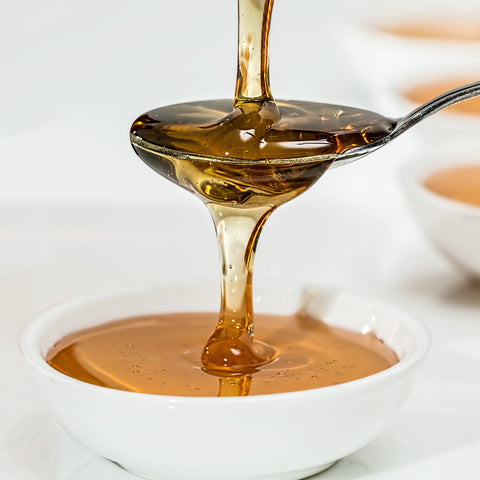
Date Sugar vs White Sugar
Which sweetener comes to mind when thinking about making a fresh batch of chocolate chip cookies? What about sweetening your coffee at your local diner? White sugar. It's been around for centuries and has become a common household sweetener, however sugar substitutes have become a recent trend in the market with people seeking out a more nutrient-rich option than white sugar. This brings us to date sugar. What is it and how does it compare to white sugar? Let's talk about it.
What is date sugar?
Date sugar is made from dried, crushed pitted dates. It retains the natural fiber and nutrients of dates, making it a nutrient-dense option. With its distinct caramel-like flavor, date sugar offers a unique taste profile in your recipes. It's best used in baking to substitute white sugar. Read here for more info on how to substitute date sugar in your favorite recipes.
What is white sugar?
On the other hand, white sugar is extracted from sugarcane and undergoes a refining process that removes most of its beneficial nutrients. White sugar is primarily sucrose, which provides a sweet taste and acts as a source of quick energy.
Date Sugar vs. White Sugar: Nutritional Value
When it comes to nutritional comparison, date sugar and white sugar differ greatly. Date sugar retains the natural fiber and nutrients from the date fruit, making it a better choice in terms of digestion and blood sugar control. It also contains essential vitamins and minerals, including potassium and magnesium. Check out the chart below!
White sugar, on the other hand, lacks fiber and other nutrients present in date sugar. This can lead to quick spikes in blood sugar levels when consumed in excess. Many health experts highlight the potential negative effects of high white sugar intake, such as weight gain, inflammation, and an increased risk of chronic diseases like diabetes and heart disease (1).
By being mindful of the potential health impacts of consuming white sugar, individuals can make informed choices when it comes to their sugar intake and opt for healthier alternatives whenever possible.

Glycemic Index Differences
The glycemic index (GI) is a measure of how quickly a particular food raises blood sugar levels. Foods with a high GI value are rapidly digested and absorbed, leading to a sharp increase in blood sugar. In contrast, foods with a low GI value are digested and absorbed more slowly, resulting in a gradual rise in blood sugar levels.
Date sugar has a lower glycemic index compared to white sugar, with an average GI of 42 (2). We go into more detail about dates, diabetes and the glycemic index in this article.
White sugar, on the other hand, can cause a rapid spike in blood sugar levels, especially when consumed in large quantities. Its GI is one of the highest at 100 (3).
Using Date Sugar in Recipes
Date sugar, made from dried and ground pitted dates, is a natural sweetener that adds a soft, caramel-like flavor to your baked goods. Substitute white sugar for date sugar 1:1, decreasing the dry ingredients called for in your recipe by 25% as the fiber in date sugar tends to soak up moisture in recipes. Read more here about substituting dates in your recipes.
Due to the fiber content, date sugar does not dissolve easily in liquids so we do NOT recommend using it for sweetening your drinks or making a sweet and savory sauce. For sweetening your coffee, making sweet tea or creating a sauce try using date syrup. In addition to baked goods, date sugar is ideal for sprinkling on top of baked goods like muffins, cookies, or oatmeal.
It's also worth noting if you're attempting to make caramel or a recipe with a caramel like crunch, date sugar may not be able to achieve this. Date sugar tends to give recipes a softer texture. You may need to experiment with your recipes to achieve your desired texture. You can also try a few of our tried and tested recipes below.
Exploring Sugar Substitutes
If you're looking to reduce your intake of white sugar or explore healthier alternatives, there are many fantastic sugar substitutes you can experiment with. Here are a few options:
Coconut sugar: Made from the sap of coconut palm trees, this sweetener has a rich caramel-like flavor and can be used in a 1:1 ratio as a substitute for cane sugar. Read more about how coconut sugar compares to date sugar.

Maple syrup: This natural sweetener derived from maple trees brings a distinct flavor to your recipes. It's a great choice for pancakes, waffles, and dressings. Read more about how maple syrup compares to date syrup.

Honey: A classic sweetener that adds depth and flavor to dishes. It's important to note that honey has a higher moisture content and may require recipe adjustments. Read more about how honey compares to date syrup.

When using sugar substitutes, it's important to do your own research to find which sweetener best fits your nutritional needs and specific tastes.
FAQ
What is date sugar made of?
Date sugar is made from dried, ground pitted dates. It retains the natural sweetness and nutrients found in the whole date fruit, including fiber, vitamins, and minerals.
How is white sugar produced?
Cane sugar is derived from sugarcane stalks. The cane is harvested, crushed to extract the juice, and then the juice is processed and refined to produce granulated sugar.
How do the glycemic index and impact on blood sugar levels differ between date sugar and white sugar?
Date sugar has a lower glycemic index than cane sugar, meaning it causes a slower and more controlled rise in blood sugar levels compared to white sugar.
Can date sugar be used as a substitute for white sugar in recipes?
Yes, date sugar can be used as a 1:1 substitute for white sugar in many recipes. (Decrease dry ingredients in the recipe by 25%) However, it is important to keep in mind that date sugar is best used in baking and not for sweetening drinks as the fiber content won't dissolve. We recommend date syrup for sweetening your drinks.
Source Links
1. https://www.health.harvard.edu/heart-health/the-sweet-danger-of-sugar#:~:text=Over%20time%2C%20this%20can%20lead,pathological%20pathways%20to%20heart%20disease.
2. https://woodspurfarms.com/date-nutrition-facts/
3. https://www.ncbi.nlm.nih.gov/pmc/articles/PMC7019254/





